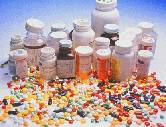 |
 |
 |

Use of Kids' Meds on the Increase
Obesity and its complications driving the trend, researchers say|
|
HealthDay
Monday, November 3, 2008
 MONDAY, Nov. 3 (HealthDay News) -- Medication use among children across the United States is dramatically increasing as more kids are being treated for diabetes, asthma and attention-deficit hyperactivity disorder (ADHD), researchers report.
MONDAY, Nov. 3 (HealthDay News) -- Medication use among children across the United States is dramatically increasing as more kids are being treated for diabetes, asthma and attention-deficit hyperactivity disorder (ADHD), researchers report.
Increased prescribing may be due in large part to increasing obesity among children and the health consequences of that trend, researchers say.
"Across all the medication classes we looked at, the rates of use increased -- sometimes dramatically," said study co-author Dr. Donna Halloran, an assistant professor of pediatrics at St. Louis University. "This is particularly concerning, given that several of these diagnoses have been linked to obesity -- diabetes, hypertension, depression, asthma."
The report was published in the November issue of Pediatrics.
For the study, Halloran's team looked at medication use among U.S. children from 2002 to 2005. Using a database of prescription claims from children with private health insurance, they were able to find prescriptions for almost 4 million children.
The researchers found that over four years, prescriptions for children aged 5 to 19 increased significantly. Among two drugs to treat type 2 diabetes, the use doubled. This increase was due to a 166 percent increase in prevalence of the disease among girls aged 10 to 14, and a 135 percent increase in prevalence among girls age 15 to 19.
In addition, the use of drugs to treat asthma rose by 46.5 percent, and the use of drugs to treat ADHD grew by 40.4 percent. The number of prescriptions for cholesterol-lowering drugs rose by 15 percent, the researchers found.
Halloran's group also found more modest increases in the use of blood pressure drugs and antidepressants (1.8 percent).
The increased rate of prescribing was much higher for girls than boys. For example, the use of drugs to treat type 2 diabetes increased 147 percent among girls, but only 39 percent among boys.
The use of drugs to treat ADHD increased 63 percent among girls and 33 percent among boys, and the use of antidepressants rose 7 percent among girls compared with 4 percent among boys.
"Whether the increased use of medications is a good thing really depends on your perspective," said study co-author Emily R. Cox, manager of outcomes research at Express Scripts Inc., in St. Louis. "Most people who would look at these numbers would indicate that these are worrisome trends."
"We need to understand what is driving this increase," Cox said. "Really, these are symptoms of underlying problems."
As the number of obese children increases, the number of children with chronic diseases is also increasing, Cox said. "That they are being treated is a good thing," she said. "The concern is, are doctors more likely to use drug therapy over diet and exercise?"
Dr. Michael Artman, head of the department of pediatrics at the University of Iowa, is concerned that children with chronic health problems who have private health insurance are getting better care than similar children who rely on government programs or who have no health insurance.
"I can imagine that the need is as great or even greater among disadvantaged children," Artman said. "We know the prevalence of those chronic conditions in disadvantaged socioeconomic classes is greater. This is kind of the tip of the iceberg in children's prescribing."
Artman also noted there is more data on prescribing medications to children, which makes doctors more confident in prescribing and means that children are getting better care.
"Now we actually have data on drug effects and side effects and toxicity and efficacy in children that we didn't have two or three decades ago," he said. "This is an important advance in pediatric medicine."
HealthDay
Copyright (c) 2008 ScoutNews, LLC. All rights reserved.
Related News:
More News on this Date
Related MedlinePlus Pages:
| Home | Health Topics | Drugs & Supplements | Encyclopedia | Dictionary | News | Directories | Other Resources | |
| Disclaimers | Copyright | Privacy | Accessibility | Quality Guidelines U.S. National Library of Medicine, 8600 Rockville Pike, Bethesda, MD 20894 National Institutes of Health | Department of Health & Human Services |
Date last updated: 04 November 2008 |




